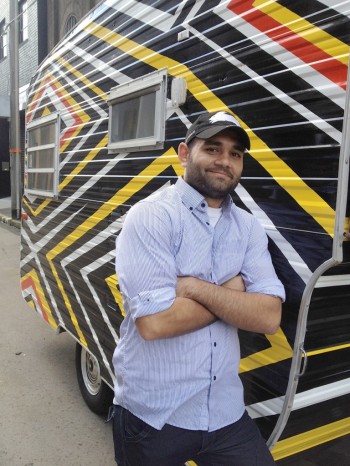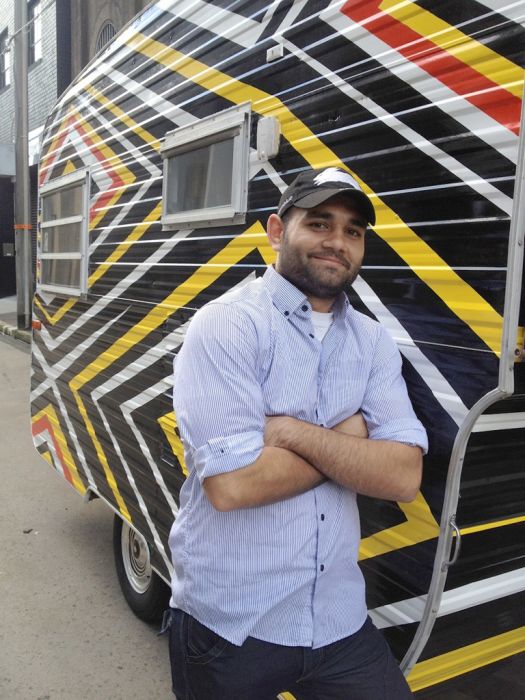
A lot has been said lately about using native ingredients as a more sustainable and healthy way to eat, and we can find more and more of them on restaurant menus. Top chefs like Quay’s Peter Gilmore, Ben Shewry and Kylie Kwong have wholeheartedly embraced native ingredients like Warrigal greens, salt bush, finger limes and kangaroo meat. For some people, however, the benefits of native ingredients have always been known, as they were used in Indigenous cooking long before Danish Chef Rene Redzepi, from World’s Best Restaurant “Noma”, made foraging trendy.
Corey Grech, whose family comes from Coonabarabran, outside the Warrumbungles, is one of them. Using native foods is something he feels very passionate about. Three years ago, helping out his sister Suzanne at her bush tucker cafe, Purple Goanna, he decided to create Kool Purple Kookas, a not-for-profit organisation that teaches Aboriginal children basic cooking skills, in order for them to adopt healthier eating habits and lifestyle.
“I came up with a program teaching kids how to cook healthy food over the course of eight weeks or longer, that gets down to the basics around knife skills and hygiene, but in a way that is comfortable for Indigenous kids to get the information, and then whilst we are there I also talk about McDonald’s and Coke, and try to lead them away from that, the mistakes I made around fast-food, football, and the direct relationship with sport and healthy food,” Corey says.
He has recently created a new program, which so far has seen him drive, intermittently, over 8,000 kilometres to visit Aboriginal communities in NSW, in order to learn more about local cooking, as well as teach healthy cooking to the kids in the communities. “I wanted to build my resources, my base a little bit, and see what the wider NSW remote community thought about it. I developed a program where I’d go out to 10 communities, I’d cook a dish that’s significant to that area, or that means a lot to those areas, and maybe some type of native food source that’s sufficient in the area, that they eat a lot, and they could teach me a dish. Then what I’ll do is I will cook a bit of a healthy spin on that dish, so there will be the original dish and then my healthy spin of it. Then I will compile that information and put it into a cookbook and send it back to the kids.”
This project was funded by the Department of Health as part of the Live Longer Campaign, which aims at promoting better Aboriginal and Torres Strait Islander health, and will allow him to publish about 500 cookbooks. “What it was all about for me was touching base with like-minded people around health in those communities and it just built to be so much more.”
Corey says that health is still a very big issue, with the Aboriginal population having one of the lowest life expectancies of the world’s indigenous populations. “It’s time for young kids to make smart decisions around what they put in their mouths, so that they don’t get these chronic diseases that make us, as a culture, wear that tag.”
He also wants to teach kids about meat and where it comes from. “We treat our source of protein very respectfully. There’s a lot more going into our culture, that they probably wouldn’t get elsewhere, we’re talking about a frame of mind. We never took any more than we needed to, and that in itself says a lot, it’s massive respect for Mother Earth. If we buy these products from the people who don’t respect it, we’re only gonna go down that same road.”
Corey wants to encourage kids to take the plunge and eat the meat of native animals. “We’re trying to talk to the kids about how important it is to eat kangaroo, to eat crocodile, to eat emu. Kangaroos are the cleanest and most sustainable food source in the world, and we choose not to eat it. It’s the healthiest for us, it’s 98 per cent fat free, and has two-and-a-half times more protein than your steak. It’s a no-brainer for me to get our own kids eating these types of meat.”
Of the 10 communities in NSW (Narrandera, Coonabarabran, Wee Waa, Tingha, Tweed Heads, Forster, Redfern, Newcastle, Wyong), he still has three to visit, but is hoping to extend the experience to the other states. “New South Wales was interesting, what is traditional for them is curries or soups. Curry pippis, curry sausages, all around processed meat, processed food, it’s not about fresh vegetables. It’s stuck in their culture, these type of dishes, and it’s time for us to get rid of them and move in healthy options as a cultural dish. It will be different when I go to Queensland, and it will be different when I go to the Northern Territory, because they still cook in the ground over there. I want to bring that information from Australia to my state and say: ‘Hey, come on, let’s up our game here!’ We want to know our cultural foods.”
This project has not only allowed Corey to provide kids with tools for a healthier life, but he feels he’s gotten a lot out of it as well: “I don’t stop learning myself, I’m a sponge at the moment, because my culture amazes me every day.”





